Introduction
Birth control pills, also known as oral contraceptives, are among the most popular methods used by women in India to prevent pregnancy and manage menstrual health. But many women still wonder — can birth control pills cause cancer?
This article explains what scientific studies have found, how these pills work, which cancers might have a slightly higher risk, and how to use them safely under medical supervision. You’ll also learn when it’s best to consult a gynaecologist through Quickobook doctor consultation for personalized advice.
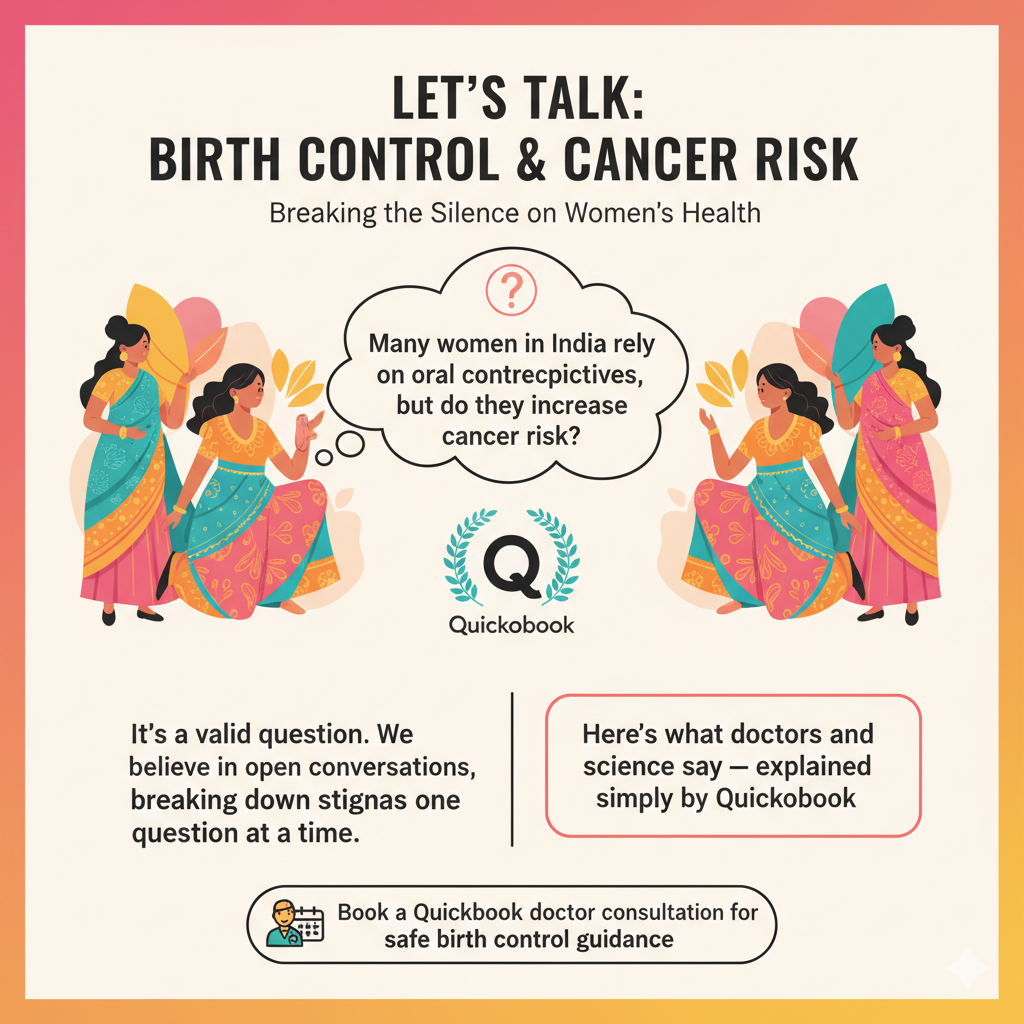
Understanding Birth Control Pills and Hormones
Birth control pills contain synthetic versions of the hormones oestrogen and progesterone. These hormones prevent ovulation (the release of an egg) and make it harder for sperm to reach or fertilize an egg.
Apart from preventing pregnancy, these pills also:
- Regulate menstrual cycles
- Reduce period pain and heavy bleeding
- Help with acne and PCOS symptoms
- Prevent ovarian cysts
However, because hormones influence cell growth in various organs, some types of cancers may become slightly more or less likely depending on how long you use the pill.
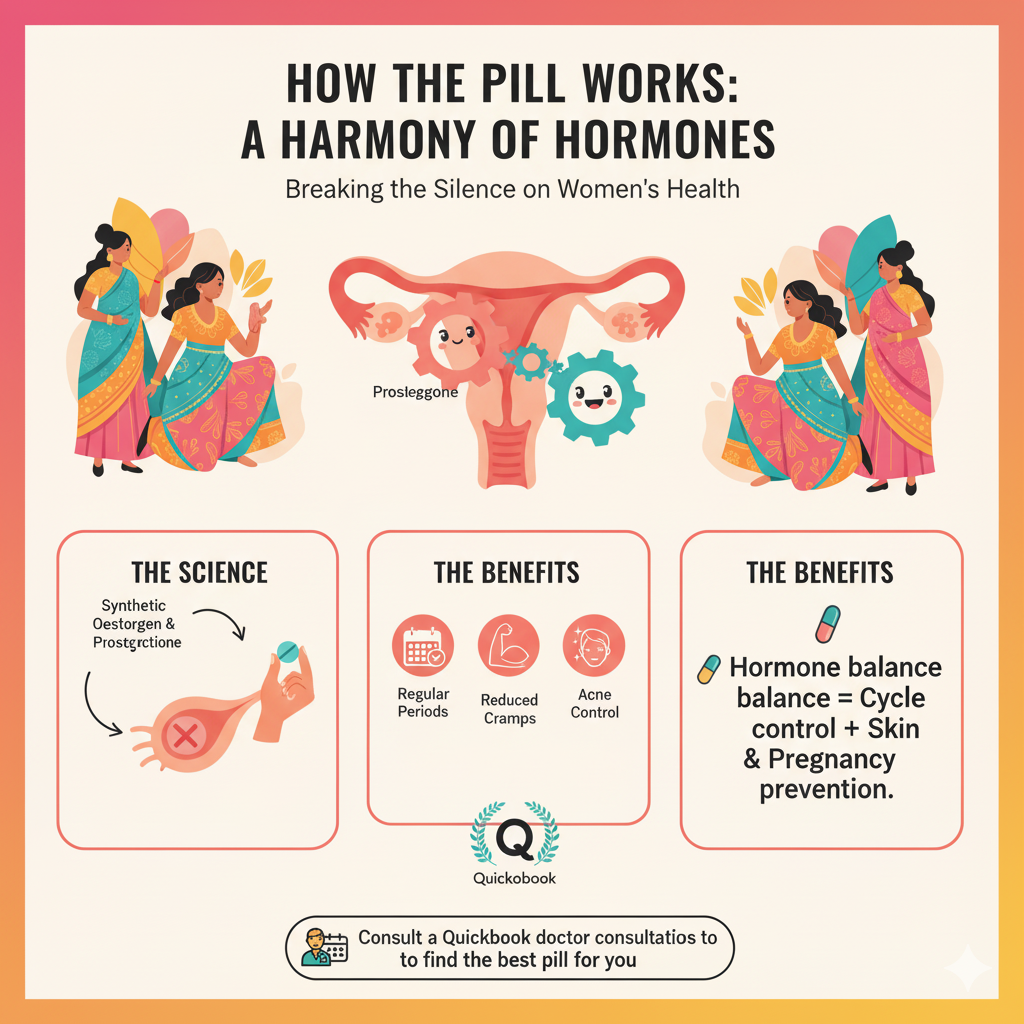
How Birth Control Pills Affect Cancer Risk
Research shows that birth control pills have both protective and slightly risky effects, depending on the type of cancer.
Slightly Increased Risks:
- Breast Cancer: Women currently using birth control pills may have a small (around 20%) increase in breast cancer risk. The good news — this risk fades within 5–10 years after stopping.
- Cervical Cancer: Using the pill for more than five years may slightly raise cervical cancer risk, especially in women with HPV infection. Regular screening helps catch changes early.
Reduced Risks:
- Ovarian Cancer: The pill can lower ovarian cancer risk by up to 50%, and this benefit lasts years after stopping.
- Endometrial (Uterine) Cancer: Regular pill users have a significantly lower risk of uterine cancer.
- Colorectal Cancer: Studies also suggest a mild protective effect.
So, while certain cancers show a small rise in risk, others are actually prevented by the same hormonal balance that the pill provides.
READ ALSO: Quit Now! The Expert’s Guide To Talking To Children About Vaping
Factors That Influence Risk
Not every woman faces the same risk. The following factors can affect how your body responds to hormonal contraception:
- Duration of use (risk slightly increases after 5+ years)
- Family history of breast or cervical cancer
- Smoking, which worsens cancer and heart risks
- Age (over 35 requires extra caution)
- HPV infection or weakened immunity
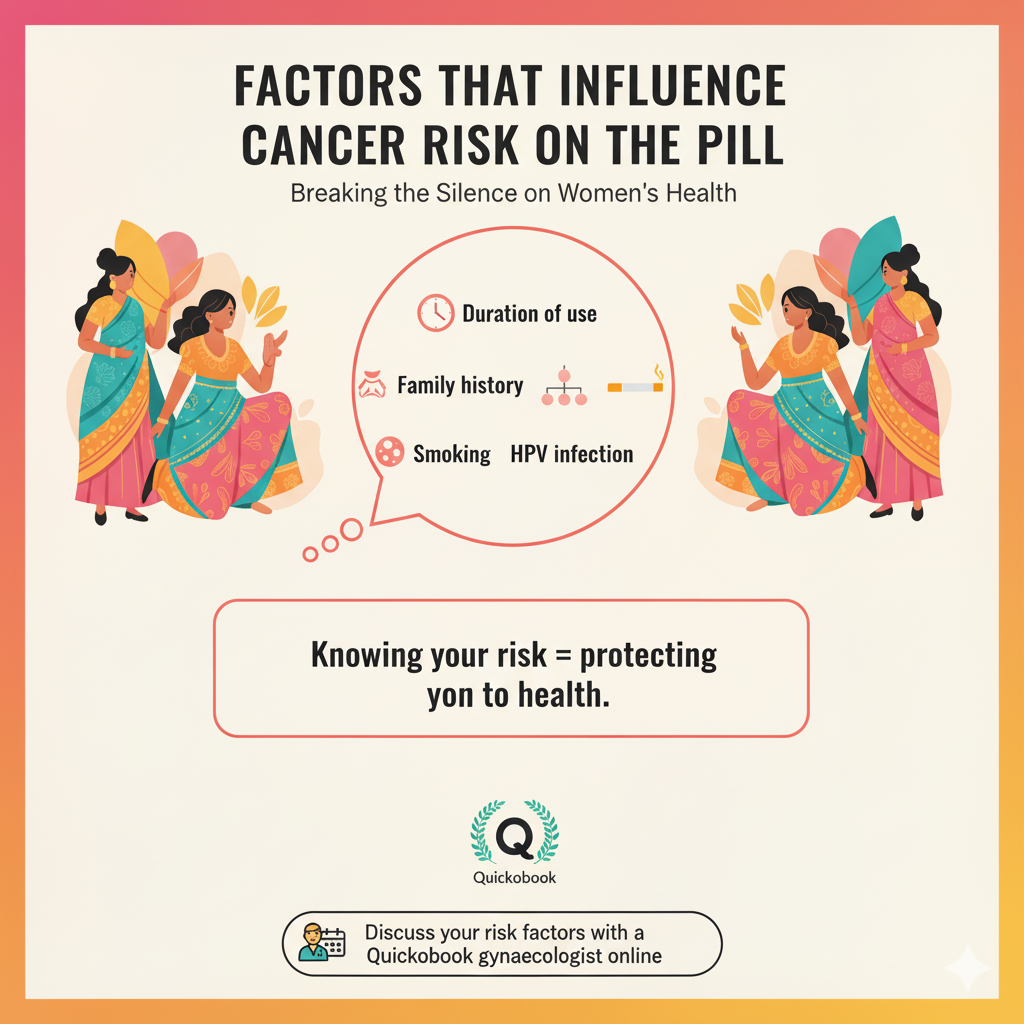
Health Benefits Beyond Contraception
Birth control pills offer several health benefits when used correctly:
- Reduce painful or irregular periods
- Help control acne and unwanted hair
- Improve symptoms of PCOS
- Lower risk of anaemia from heavy bleeding
- Prevent some ovarian cysts
These benefits make pills a safe and convenient option for many women in India — especially under the guidance of a qualified gynaecologist.
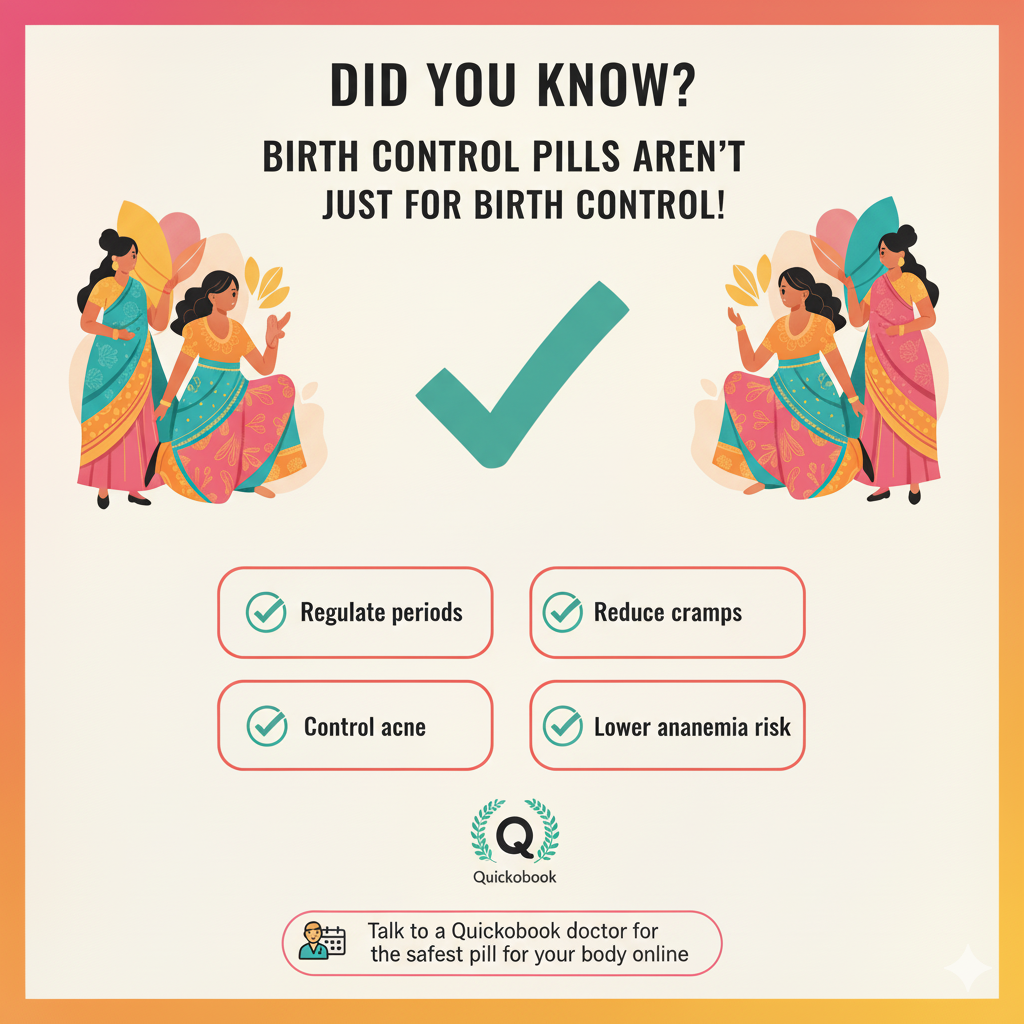
When to See a Gynaecologist
Schedule a Quickobook doctor consultation with a gynaecologist if you notice:
- Breast lumps or discharge
- Abnormal vaginal bleeding
- Persistent pelvic or abdominal pain
- Strong family history of cancer
- Any unusual changes after starting the pill
Your doctor may suggest safer alternatives such as non-hormonal IUDs or hormone-free contraception, along with routine screenings like Pap smears and breast exams.
Tips for Safe Birth Control Use
- Take pills daily at the same time.
- Avoid self-medication; always follow your doctor’s prescription.
- Share your complete medical and family history with your doctor.
- Quit smoking and limit alcohol.
- Exercise and eat a balanced diet to support hormone health.
- Go for regular checkups and screenings.
Lifestyle Tips for Prevention
Simple lifestyle habits can lower your overall cancer risk:
- Eat fibre-rich foods, fruits, and vegetables.
- Maintain a healthy weight.
- Reduce stress with yoga or meditation.
- Track your menstrual health regularly.
- Get HPV vaccination if eligible.
Myths vs. Facts
|
Myth |
Fact |
|
Birth control pills always cause cancer |
They slightly raise some cancer risks but reduce others |
|
Stopping pills suddenly prevents cancer |
Always consult your doctor before stopping |
|
Pills cause infertility |
Fertility returns soon after discontinuation |
|
Natural contraceptives are safer |
They are less effective and may still carry hormonal risks |
Role of Quickobook Doctor Consultation
Finding the right gynaecologist can be challenging, but Quickobook makes it easy. The platform connects you with verified doctors across India for both in-person and online consultations.
With Quickobook, you can:
- Book appointments instantly
- Compare doctor profiles and ratings
- Discuss menstrual health, birth control, or side effects privately
- Access trusted care from anywhere — big city or small town
Your reproductive health deserves expert attention, and Quickobook ensures you get it conveniently and affordably.
Conclusion
Birth control pills are generally safe and effective for most women. While there may be a slight rise in breast or cervical cancer risk, these risks fade with time — and the pills offer strong protection against ovarian and uterine cancers.
If you’re unsure whether the pill suits your body or family history, talk to a Quickobook gynaecologist today. With proper guidance, regular checkups, and informed decisions, you can enjoy both safe contraception and good menstrual health.
50 Frequently Asked Questions (FAQs)
1. Can birth control pills cause cancer?
They may slightly increase breast and cervical cancer risk but lower ovarian and uterine cancer risk.
2. Are pills safe for long-term use?
Yes, if monitored by a doctor.
3. How long can I safely take birth control pills?
Duration depends on your age, health, and doctor’s advice.
4. Does stopping the pill reduce risk?
Yes, within 5–10 years, your cancer risk returns to normal.
5. Can pills cause breast lumps?
Not directly, but they can cause temporary breast tenderness.
6. Do pills help prevent ovarian cysts?
Yes, they’re often prescribed for that purpose.
7. Are birth control pills safe after 35?
Yes, if you don’t smoke and your doctor approves.
8. Will pills affect my fertility later?
No, fertility usually returns soon after stopping.
9. Can I take pills if I have PCOS?
Yes, they help balance hormones and regularize periods.
10. What should I do if I miss a pill?
Take it as soon as possible and use backup contraception if needed.
11. Can pills cause weight gain?
Minor bloating or water retention may occur.
12. Do I need tests before starting?
Yes, a doctor may suggest a few blood and hormonal tests.
13. Are mini-pills safer?
They may be better for some women — consult your doctor.
14. Can I use pills while breastfeeding?
Yes, only progestin-only pills are safe during this period.
15. Can pills affect mood?
Some women notice mood changes; seek help if severe.
16. Do pills protect against STIs?
No, only condoms protect against sexually transmitted infections.
17. Are Indian birth control pills different?
No, they contain similar ingredients as global brands.
18. Can emergency pills cause cancer?
No, they are safe for occasional use.
19. How do pills reduce ovarian cancer risk?
They prevent ovulation, reducing cell stress in ovaries.
20. Should I take pills if I have fibroids?
Yes, they often help control bleeding — but see your doctor first.
21. Can birth control pills increase cervical cancer risk?
Yes, slightly with long-term use, especially if HPV positive.
22. How can I reduce my cancer risk on pills?
Regular screenings and a healthy lifestyle are key.
23. Can pills regulate irregular periods?
Yes, that’s one of their main benefits.
24. Is spotting normal on pills?
Yes, especially in the first few months.
25. Can I drink alcohol while on pills?
Moderate use is fine; avoid heavy drinking.
26. Should I take a break from pills?
Only if advised by your doctor.
27. Do pills cause thyroid issues?
They don’t cause thyroid disease but may affect test readings.
28. How often should I visit my doctor?
Every 6–12 months for a routine checkup.
29. Can pills help with acne?
Yes, they improve hormonal acne in many women.
30. Do pills delay menopause?
No, they just regulate periods until menopause.
31. Are low-dose pills safer?
Yes, they have fewer side effects and similar effectiveness.
32. What if I vomit after taking a pill?
Take another one within 12 hours.
33. Can I buy pills without prescription?
Yes, but medical advice is still important.
34. Can pills cause blood clots?
Rarely, mostly in smokers or women with clotting disorders.
35. Can pills help with menstrual pain?
Yes, they make periods lighter and less painful.
36. Do pills lower endometrial cancer risk?
Yes, significantly.
37. Can I skip my period using pills?
Yes, under your doctor’s supervision.
38. Can I take pills if I have diabetes?
Some are safe — consult your gynaecologist first.
39. Do pills affect the liver?
Only rarely, with long-term use.
40. Can I switch pill brands?
Yes, after checking with your doctor.
41. Can pills cause hair growth?
They usually reduce excess hair growth.
42. Should I stop pills before surgery?
Yes, sometimes advised to prevent clots.
43. Can I use pills if I have migraines?
Only certain types are safe — consult a doctor.
44. Do other medicines interfere with pills?
Yes, antibiotics and epilepsy drugs can.
45. Can pills cause depression?
Some women feel mood changes; seek support early.
46. How soon does risk reduce after stopping pills?
Within 5–10 years.
47. Where can I get medical advice on pills?
Through Quickobook doctor consultation online or in-person.
48. Can I start pills during my period?
Yes, many doctors recommend starting on Day 1 or 2.
49. Are herbal contraceptives safe?
No, they aren’t proven or regulated.
50. Do I need cancer screening while on pills?
Yes, regular Pap smears and breast checks are recommended.
Quickobook CTA
Worried about birth control side effects or menstrual health?
Book a Quickobook doctor consultation with a trusted gynaecologist near you today.
Expert care, private guidance, and affordable fees — just a few clicks away!
Disclaimer:
This article is for general awareness only. It does not replace professional medical advice. Always consult a qualified gynaecologist or physician before starting or stopping any medicine.
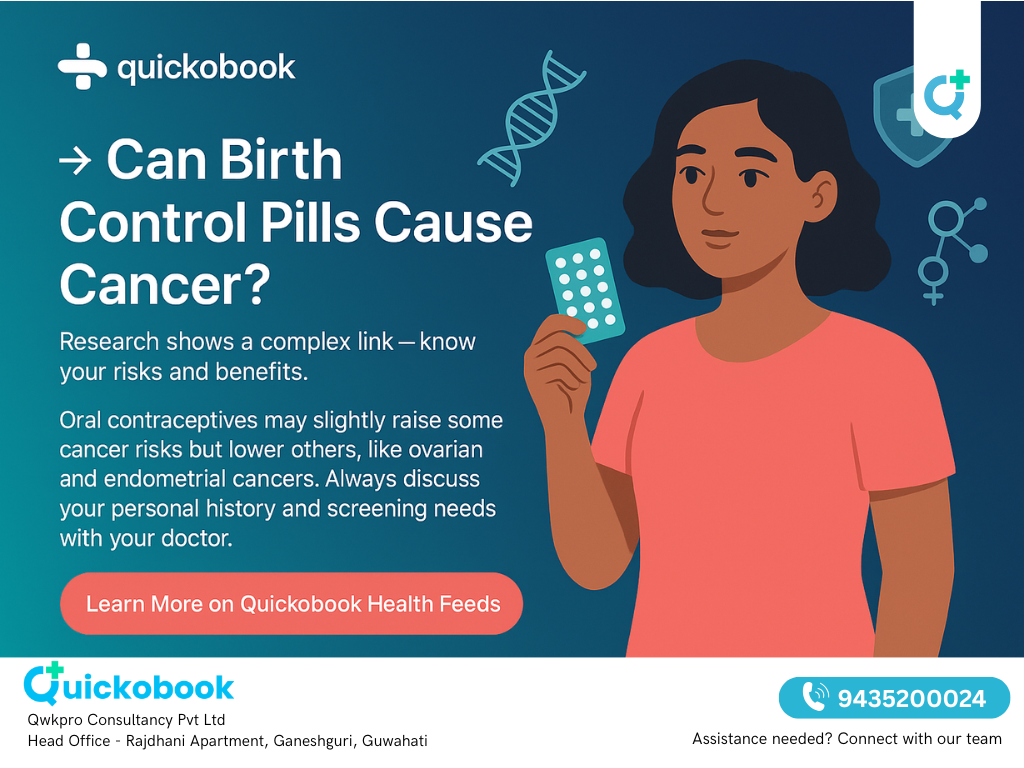









Comments (0)
No comments yet. Be the first to share your thoughts!
Leave a Comment